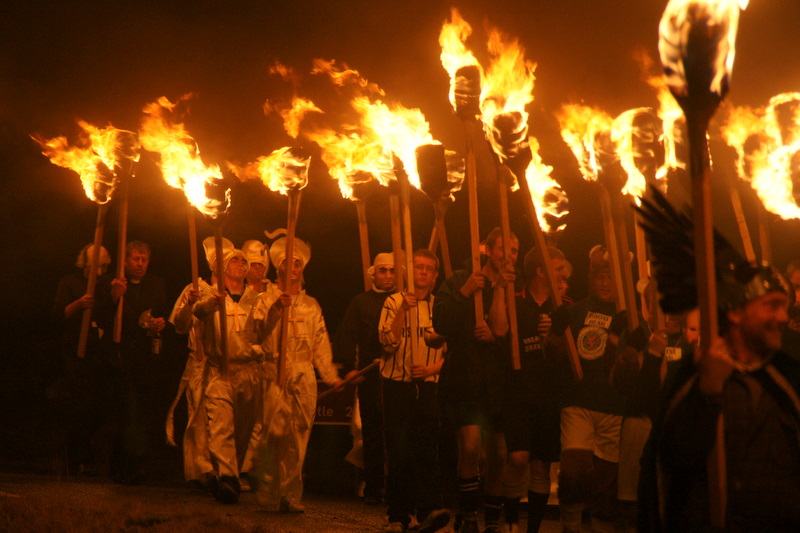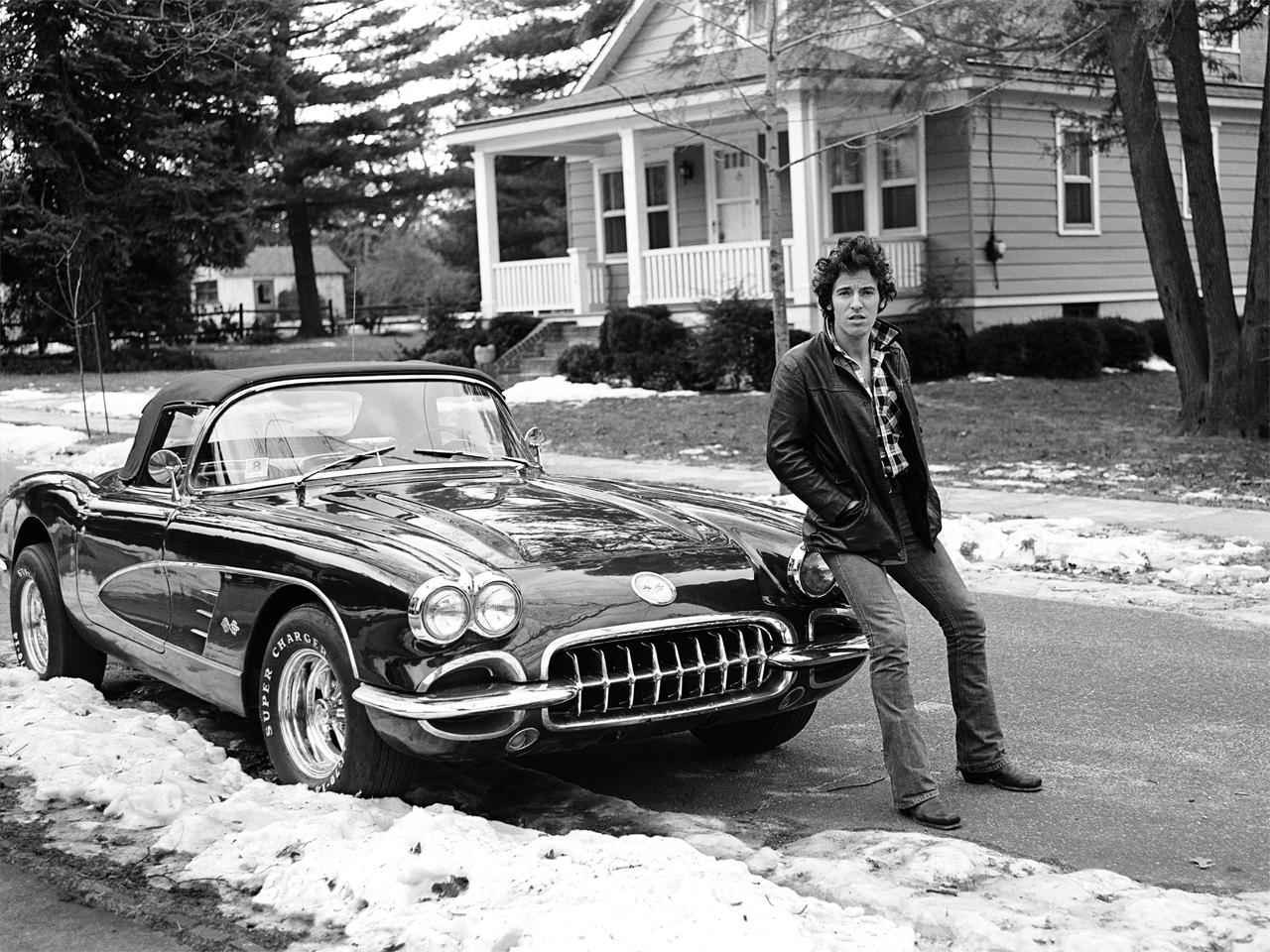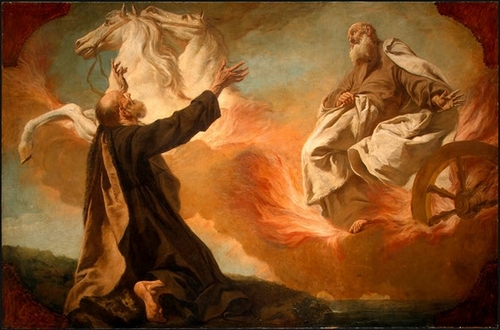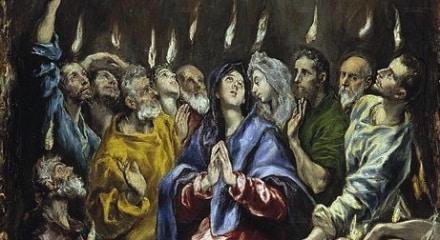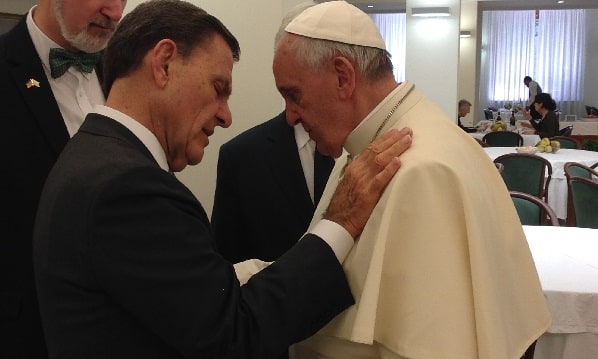While I am far from a Biblical literalist, I am not so quick, as are many modernists in the church today, to reduce everything in Scripture to a fascinating, if useful, fiction.
And while I do not read Genesis as if it were designed to be an account of "Eden's itinerary", neither am I shut off to the extraordinary possibility that something, well, "extraordinary" happened there. Furthermore, I am also not trapped within a worldview that regards empiricism as the only reputable kind of truth that exists out there (as if man were somehow able to live by math alone). To the contrary, there are any number of truths that we do
live by every day, and most of them move well beyond the nomenclature of the binomial system.
Enter the Book of Genesis, which is often dismissed by "thinking people" as ignorant superstition, and by "unthinking people" as true because, well, God said it. I will not get into which particular position is more sympathetic to me, I will only say that I am not satisfied with either one.
In any case, after reading both Genesis creation accounts, what I am most struck by is not how purely mythological they are, but rather how remarkably rational they are. Nevertheless, I will not attempt to argue here that Genesis possesses a bunch of modern scientific categories (which is impossible and anachronistic for any number of reasons), but rather what I will attempt to argue is that Genesis Chapters 1-2 are philosophically sound, and offer any number of insights that are in fact the precondition for scientific and philosophical progress (yes I said that). Below I provide thirteen examples of what I believe to be the most essential philosophical insights provided in the aforementioned creation accounts.
1. "In the beginning..."
Insight #1: Time and space have a distinct starting point...
In order to study something scientifically in a manifestly satisfactory way, you must have an understanding of the essential nature of thing that you are studying. Whether the universe is eternal, or began to exist at a certain point 13-14 billion years ago (along with all of the rest of space and time) matters. Indeed, 21st century science would be unimaginable without that prior assumption. And yet as recent as one hundred years ago, most scientists accepted something called the "steady state theory," which posited an eternal universe.
Knowing what type of universe we are living in is a pretty essential starting point if you are going to do any real scientific investigation. Yet equally important, at least to me, is knowing that I believe in a Faith that not only doesn't contradict the current model of the universe, but rather (to the contrary) seems to have ultimately anticipated it. I am not a scientist, nor do I play one on TV, but the story of the priest Fr. Georges Lemaitre is a compelling one, especially when you consider that his initial attempts to convince Einstein of Big Bang theory (or as he called it, the Primeval Atom) failed. And why did his initial attempts fail? Because, at least in part, Einstein feared the religious implications of the model. So much for following the evidence where it leads!
2. "... God..."
Insight #2: The idea that the universe had a "First Mover," or an "Uncaused Cause," is not only a Judeo-Christian concept, but was posited by ancient philosophers as well
The simple statement "in the beginning God..." is meaningful not only from a religious standpoint, but also from a scientific one as well. From a religious view-point it is a radical statement simply by virtue of suggesting that there is only one God who, by Himself, generated all of creation. In the ancient world, the notion that there was one preeminent god was relatively common, but the notion that there was One true God (not merely one to be placed foremost in a larger landscape of competing gods) was truly unique. From a scientific point of view the assertion that God was there in the beginning, both confirms and introduces, not necessarily a God to be worshipped, but rather a First Principle, or Uncaused Cause. While the mystery remains as to why there is any "Principle" at all, the simple act of allowing for the possibility of some kind of Primordial #1, explains how all subsequent numbers can exist in the first place. Indeed, without this assumption about life how would one do any scientific investigation at all. To accept an ultimate "Ground of Being" respects the rule of science, even if it maintains the mystery of religion. Ironically, it is the atheist alternative that essentially rejects the basic rule of cause and effect (which is a truly unscientific formula) by embracing the more illogical mystery, the notion that everything was just there.
In a most remarkable way, then, Occam's razor comes to the defense of the Hebrew God, for what more concise explanation could there be than the notion that there must have been some kind of Primordial #1 in order for there to have been any subsequent numbers.
3. "...created the heavens and the earth"
Insight #3: Modern science assumes design, order, and intelligibility in the universe, how else would one even begin to do science in the first place without this presupposition?
A "creative" order is assumed in Genesis (is there any other kind?). Yet one does not need to be a believer to assume it. To put it another way, believer or not, we function and operate in the world as if we believed in design even when we claim not to believe in an overarching Designer. We do not regard the universe as ultimately unfathomable (as did the ancients), but rather as a kind of willing partner, both intelligible and logical, in the larger project of discovery. But whatever you believe in this regard, what is essential to understand here is that we assume a posture towards our world and cosmos as one who believes, even without believing.
Whether scientist or theologian, we believe that "everything happens for a reason". Thus, if we take it as a given that the cosmos is both logical and intelligible, then why would we also not assume that at the back of it all there is also some kind of larger "Logos" and Intelligence? Indeed, if we already assume that the forces of nature are capable of being commandeered for the sake of our own "designs", then what precipitated this awareness, save a God who is Himself fully aware of the larger Architecture?
4. "God saw all that he had made, and saw that it was very good"
Insight #4: Genesis provides a rational explanation for man's natural pursuit of the good life, of progress, and of human perfectibility
For something to be truly insightful it must possess, on a certain level, an idea which might be described as counterintuitive, otherwise why even point it out. Enter our fourth insight on the list. Based on what we see in the world every day (or throughout history), the average observer might describe their earthly experience in any number of ways. They might say that the world is meaningless, they might say that it is generally evil, they might even say that it is some combination of both (all of these views were particularly common in the ancient world). What would have been completely incomprehensible (or even laughable) to individuals in antiquity would be the notion that world was from top to bottom "good". On many levels this is patently absurd, if not easily falsifiable (or so it seems).
Yet without this basic conviction about the world, how could man have ever advanced as a collective. Indeed, it is this pervading sense of a higher "goodness", in spite of the daily evils that confront us, that inspires us to move beyond mere barbarism, whether one believes in a Deity or not.
5. God created each thing "according to its kind"

Insight #5: While the basic idea of evolution is compatible with Genesis, so also is the notion that each creature is intended (i.e. things are things and not merely an indistinct amalgamation of accidents)
Another feature of the creation accounts that is impressive, philosophically speaking, is the methodical manner in which creation unfolds. While some intellectuals get hung up on certain fundamentalist details (like whether or not birds of the air really precede land mammals), others take note of just how remarkably coherent and rational the description is as a whole. And this is all without the aid of many centuries of scientific research at their disposal. When one compares this account in Genesis to any other primitive account of how the world came about, it is like night and day (no Genesis pun intended). From gods tearing each other to shreds in the process of "creating the world", to accounts of deities purging themselves (i.e. vomiting) as a method of creating the earth and everything in it, it is difficult not to recognize just how much more rationale the account in Genesis appears to be. The world is intentional and rational, meaning that there is an internal logic to the way it unfolds. In fact, not only does the narrative allow for an interpretation of creation that could unfold over eons, but it also provides room for an evolutionary view of how life came to be in the universe. The narrative begins with the formation of land and sea, then slowly we move to vegetative life, after which life develops and "teems" in the water, then on land, in the air, and then finally it culminates with man. This is not science in the strictest sense of the word, but it is a rational and logical explanation of the order of events. This is not to say that every other creation myth lacks an internal logic, but they do lack, in several significant ways, the kind of logic and earthiness that would lend themselves to the study of science as we undertake it today.
6. "Then God said: 'Let there be lights in the dome of the sky, to separate the day from the night. Let them marked the fixed times, days, and years..."
Insight #6: The cosmos is rational and orderly, and behaves according to fixed laws. Thus, unlike other ancient cosmologies, Genesis lays the groundwork for a rational understanding of the universe
Unlike just about every other ancient tale surrounding the origins of the cosmos, the celestial bodies in the book of Genesis are not gods. In fact, according to the Book of Wisdom, everything was created having, "measure, number, and weight." From the perspective of the ancient world, the notion that the cold eyes in the heavens were anything but inscrutable and indifferent, would have been a fancy supported by little more than mere speculation. Such a view would not have been perceived as bold, it would instead have been perceived as arrogant, if not laughable. Socrates and Plato prized something called "epistemological humility," a kind of ancient agnosticism rooted in the inescapable notion that man was helplessly ignorant and in no position to assert anything dogmatically about the heavens. Who are we? Who made us? Why are we here? Few answers seemed forthcoming from that massive, terrifying and unpredictable dome that loomed above. Yet here comes the book of Genesis, suggesting not only that there is a method to this cosmic madness, be even better still, a purpose and intention that naturally inclines itself to a rational study of the heavens.
7. "... And the name of the third river is the Tigris, it runs along the east side of Assyria. And the fourth river is the Euphrates..."
Insight #7: The Genesis creation narrative is uniquely "down to earth," especially when compared to other primitive creation stories
While the story of Eden is prehistorical in its approach (because by definition it is pre-history), what is most striking about the narrative is the fact that most stories of a mythological nature tend to feel more like fantasies disconnected from certain concrete realities (e.g. Mount Olympus or Xanadu). However, what is most striking about Genesis is just how remarkably down to earth the description really is. Though it passes through (and describes) the various ages and eons of the earth, it never departs from the sober and solid realities that are recognizable to the casual observer. Even while the terminology remains pre-scientific, especially in terms of how it articulates the nature of the cosmos, there is still the presence of a very rational, if rudimentary, approach to the world around us.
In some ways Genesis is profoundly dramatic for not being terribly dramatic at all- believable because it is so very clinical and repetitive. It is a little like Jesus post-resurrection when he makes breakfast for the disciples. "Breakfast with Jesus" is a remarkable statement (and believable) simply for its mundanity. In the same sense, when I discover that Eden was located between two rivers that can be located on any map today, I am stunned by the accessibility of it all. Does this mean that it proves that Eden was precisely there. No. But it does prove that the authors did not see this tale as a kind fanciful bedtime story, or even some kind of pleasurable dream, but rather something deeply rooted in space, time, and as it is pointed out here, geography.
8. "Then the Lord God formed man from the dust of the ground and breathed into his nostrils the breath of life, and the man became a living being"
Insight #8: Why does man believe himself to have a free will, a conscience, a sense of rationality, and a higher purpose? Either he is delusional, or these qualities are real and have a source
The evolution of man chart has been used in any number of hilarious ways, not because evolution is hilarious, per se, but because man, while physically a match for this seamless chart, from intellectual standpoint is a misfit in the most humorous of ways. Why do I say humorous? Because, quite literally, humor and irony are not something that our evolutionary ancestors engage in any discernible way, at least not on this level (i.e. doing science, making a chart in order to explain primate development, then making an ironic bumper sticker as a humorous and insightful reflection on how different man is from the rest of the creation). We are indeed 98.6% the same (DNA-wise) as our closest animal ancestor, a detail which is fascinating in and of itself. Yet what is even more fascinating is the stunning difference that 1.4% of DNA can make. This inexplicable "ontological leap", as the late John Paul II called it, is a profound mystery however you slice it, and simply saying that it happened slowly over a really long period of time, doesn't exactly offer much in the way of
causation. Stephen Hawking once put it this way; "Millions of years ago mankind lived just like the animals, then something happened to unleash the power of the imagination... we learned to talk." "Something" indeed happened, something which cannot precisely be accounted for on the empirical level, and thus requires a different order of truth, one that is less about mechanics, and more about meaning. That Great Big "Something" is described by divine revelation as an intimate and profound investment of Self from the One who made everything; "he formed man out of the earth, and breathed into his nostrils". No other creature in Genesis is created directly by the hand (and breath) of God. What else could explains this profound disjunct, or rather mind-blowing evolutionary leap? Like inanimate matter becoming animate, there seems to be a rational demand for a rational explanation. Some may think this is begging the question", but what is more of an intellectual dodge, saying that "something (mysterious) just happened", or claiming in the most basic terms that whatever that Something mysterious is, it has to at least possess the same characteristics that we inexplicably possess. At any rate, whatever one believes on this front, there are two possibilities offered here, that the One who is Rational, Free, Good, Ironic, and Powerful shared with us some of his divinity, or that there really is no satisfactory explanation for all of these delusions of grandeur, other than to say that they are "God delusions."
9. "And the Lord God commanded man; "You are free to eat of any of the trees in the garden; but you must not eat of the tree of the knowledge of good and evil, for when you eat from it you shall surely die'"
Insight #9: The fact that the majority of humanity (even atheists) recognize a general morality, not to mention personal responsibility, only confirms the instincts of the Eden narrative
The fact that a man has a sense of right and wrong, a conscience, a volition, may in the end be a grandiose delusion. However, to claim this without any concrete evidence to confirm this hypothesis is simply begging the question. Because some people are deluded when employing any of the aforementioned concepts does not then mean that these concepts are therefore void. In other words, you still have to address the origins of this sense of moral responsibility.
It is interesting to note that while atheists by definition deny the very existence of God, they do frequently appeal to morality in order to condemn this God. It is, for example, in their opinion, both immoral and illogical to believe in the God of Christians, Jews, and Muslims (in whatever order you prefer). Yet the point here is that while many diverge on what is moral and what is immoral, few would in practice deny the basic premise of morality, the notion that in order to have a prosperous, happy society, there needs to be sufficient degree of freedom, choices which redound to the happiness of the individual, and to the larger society as a whole. Not to mention a citizenry that is willing to correct its errors, especially when the collective is going down the wrong path. You may call this awareness of wrong-doing, "shame", as does Genesis, or you may call it "regret", as a secular individual might. In any case, whatever you call it, you cannot explain it away, without both literally and figuratively doing violence to what it means to be human. Indeed, would anyone argue this point, especially when one considers the behavior and disposition of a sociopath?
10. "It is not good for man to be alone"
Insight #10: Man is made for communion
My favorite philosophical insight from Genesis is this one. Why? Primarily because it is a psychological insight, which is not necessarily the general focus of Scripture. While dogs may be "man's best friend", they can only go so far in nourishing our deepest longings for companionship and communion (consider why "crazy cat lady" is regarded as crazy). Thus, when the second chapter of Genesis informs us that everything that God created was good... except the condition of "man being alone", we should take particular notice. Even the tree of the "knowledge of good and evil" is not deemed bad, rather it is simply off limits to man in his current state. While in some ways such a detail may seem tangential, it is anything but. In point of fact, highlighting this particular need in man, not only lends insight into the precise nature of psychological evil, but into the nature of spiritual evil as well.
Whatever else man is, he is not a psychological unitarian, he is rather an utterly contingent being (dependent for his existence on others), or in a more positive sense he is communitarian/ trinitarian.
11. "Then God said; 'Let us make mankind in our image, after our likeness...' So God created mankind in his own image, in the image of God he created him; male and female, he created them."
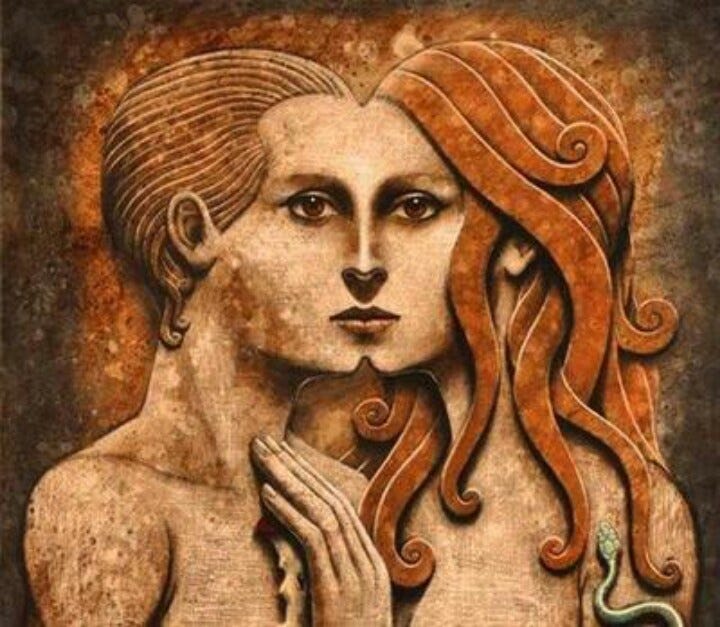 Insight #11: The communion that is expressed in the basic constitution of the family (Father/Mother/Child) is necessary for the positive evolution of the human species
Picking up where I left off from the previous insight, not only is it not "good" for man to be alone, but from an evolutionary standpoint, man cannot neither "survive" nor be "fit" unless he rejects- on every level- this kind of anthropological solipsism.
Insight #11: The communion that is expressed in the basic constitution of the family (Father/Mother/Child) is necessary for the positive evolution of the human species
Picking up where I left off from the previous insight, not only is it not "good" for man to be alone, but from an evolutionary standpoint, man cannot neither "survive" nor be "fit" unless he rejects- on every level- this kind of anthropological solipsism. In fact, man is not even
man by himself. He is only fully himself (as well as a reflection of God) when he is seen in communion with woman. This explains the paradoxical language in the above clause; "God created him... he created them." As the band the Who once said; "in life 1and 1 don't make 2, 1 and 1 makes 1." Moreover, this idea of communion seems to reflect larger logic of the passage. Why else would God describe the divine experience in terms of "us", and then subsequently follow with these words; "it is not good for man to be alone"? So the full picture of humanity (as well as divinity) is expressed in a paradox. Why? Because the fullness of humanity is not expressed in merely a "him alone", but also a "them" as well. And furthermore, when this living paradox is expressed in the form of a sexual union, it winds up not only being fruitful in the biological sense, but it quite literally becomes embodied in the face of the child. For in the face of the child the man and woman
really are
one.
12. "... And let them have dominion over the fish of the sea, the birds of the air, over the cattle and over all the earth, and over every creeping thing... So the man gave names to all the livestock, the birds of the air and all the wild animals. But for Adam no suitable partner was found."
Insight #12: Man is from the beginning a scientist and a biologist, for not only does he seek to harness and understand nature, but he also seeks to name it, not merely for amusement sake, but presumably based on some particular insight about it
The door of anachronism swings both ways. It may be anachronistic to say that Adam was the first biologist, but if that is true, then it's equally silly to call Karl Linnaeus the first one to name and classify animals. In any case, there is a natural kind of "scientific" disposition in man right from the get go, at least as far as the science of categorizing and naming the animals. Yet the larger anthropological point is not merely that this classification continues to "happen", but rather that there is a basis for it happening. Indeed, according to Genesis, it is man's job to be both governor and steward of creation. And the sign of that "governorship" can be seen in his simple power to name and describe things. There is a reason animals can't enforce animal rights, while humans can.
Our unique awareness of the mistreatment of animals is derived from the fact that we are ontologically superior to animals. If we were genuinely equal to other animals we could simply destroy them without impunity- as they do to one another. There is a worthy debate to be had about where that line should be drawn, but even in that case, Genesis strikes a valuable balance, avoiding the two possible extremes (e.g. animals are equivalent to humans versus animals exist purely for the slaughter).
13. "Now the serpent was more subtle than any of the other wild animals the lord God had made. He said to the woman; "'Did God really say that you must not eat of any of the trees in the garden?"
Insight #13: Genesis offers the most satisfying and practical explanation for why we are divided even within ourselves
Though this verse appears at the beginning of chapter 3 in Genesis, it is pertinent to this list. for it offers a fascinating insight into the apparent psychological and spiritual schizophrenia from which every human suffers. The story of the Fall not only provides an explanation for our inner conflict, but also seeks to warn humanity about two equally horrible (logical) abysses. The first logical abyss involves atheistic nihilism. The second logical abyss involves a view God that would impute to Him malicious intent.
Something is wrong with the world, and even the most hardened atheist will rarely deny it. Yet there can't be something wrong, unless there's something that is ultimately Right. And the mystical tight wire upon which this passage teeters (coupled with Catholic interpretation) is the only one I've ever heard that preserves the aforementioned original "goodness", while simultaneously offering a satisfactory explanation for the evil that does exist. Evil is not a pre-existent material (like a god), as Genesis suggests, but rather the free decision to act against one's nature (which is synonymous with God's will). This conclusion proves not only logically consistent (though some may understandably dwell on certain confounding details therein), but also a workable hypothesis from a practical standpoint (i.e. from the perspective personal improvement). In any case, every true insight is like a riddle solved, or even a lot like a punchline being delivered that is both witty, surprising, and right on the mark.

